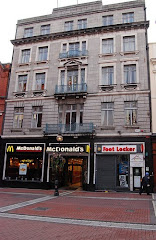The Dead
The last five paragraphs of “The Dead” are a humongous shift in tone and narrative compared to the rest of Joyce’s story. The preceding pages deal mainly with superficial and everyday happenings of close friends and family and do not touch upon things like the “soul, “shades”, and “death,” that are found towards the end of the story. This shift from a mundane and neutral tone to a dark and death obsessed one is the most compelling aspect of this short story.
Epiphanies are commonly used by Joyce to give his short stories greater meaning and mysteriousness. These epiphanies are usually found towards the end of the story and completely change the reader’s feelings and conclusions about its meaning. In “The Dead” Joyce once again employs this tool to express the inner nature of the character Gabriel. Until the final pages of the story the readers learn little about the character of Gabriel; we know that he is a great orator, loves his family, and has a slight aversion to Ireland (revealed when Mrs. Ivor asks him to accompany her to Galway.) Besides these things the narration gives us little information about the true nature of Gabriel. When Gabriel’s wife, Gretta, tells Gabriel about Michael Furey and his death and passionate love for her, Gabriel has an epiphany about death and his life as a whole. He discovers that he has never experienced love in the way that Michael and Gretta did and suddenly Gretta seems like a stranger after years and years of marriage. He envies Michael for dying at a time when his life actually meant something and “shivers” at the thought of death at an old age. The intensity of passion and love that is present in Gretta’s story causes Gabriel to reflect upon his fading identity and the closing in of death. One of the most interesting sentences of the final paragraph of the dead is, “The time had come for him to set out on his journey westward.” This sentence comes after Gabriel describes the dullness of his life and the disillusionment he has about his marriage. Gabriel is having what we call in America “A mid-life crisis,” the past 40 years are flashing before his eyes and he is questioning whether he has actually accomplished anything that he set out to accomplish. Instead of buying a sports car Gabriel wants to journey westward, most likely America, where he can rekindle his life. Gabriel feels bogged down by the nationalism and the overall emphasis on the past that is present in Ireland and wishes to escape all of this by traveling westward; this can be seen in the final paragraph where he is describing the snow falling upon the graves of his dead countrymen.

No comments:
Post a Comment